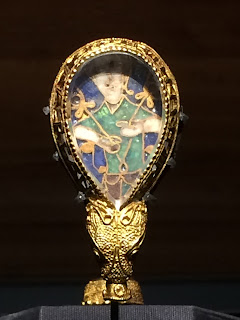Friends:
Thanks for your patience over the last five months as I have walked through at least a high level review of Anglo Saxon History.
(Offa's Dyke - Source)
This project became a lot more involved than I had originally anticipated. My initial thought was that this was a way to help me keep a commitment to study Anglo-Saxon this year with an eye towards performing a reference-free translation. What it turned into was a 700 year review of British History - a pretty ambitious goal for someone with a small blog that writes this in his free time.
In reviewing history, there is so much we did not touch on. Anglo-Saxon artists produced metallurgy and art the equal of anything else. Anglo-Saxon governing institutions set in place certain practices and beliefs that in some small fashion continue down to our day. Anglo-Saxon literature (which we will hopefully touch on) remains as fresh and insightful as it did back in the day.
It strikes me that last month is the 30 year anniversary of my cessation of formal tertiary education and since that time, I have not undertaken a research project to this extent or this depth. It comforts me to know that those skills are not entirely lost and, when prompted, the art of performing research is still something I can access (Using new tools, of course; in my day the InterWeb was barely a thing for research).
(Anglo-Saxon Sword Belt End Ornament, Sutton Hoo Burial - Source)
At heart I am a historian and, like all historians, believe that the present can only be understood by the past - not the past as we wish to find it, but the past as it really happened. Hopefully this less than brief excursus can shed some light on how England came to be England and where some of the traditions and beliefs of even our own day date from.
Next steps? I am still thinking this through. A brief review of the language might be in order (although Old English is technically "English", it has a number of characteristics which are as foreign to us today as any other foreign language). And certainly touching on the literature, the main vehicle of Old English, is worthwhile, as the Anglo-Saxons were as skilled writers and observers as any in the modern era.
(Chapel of St. Peter-on-the Wall, built 654 A.D. - Source)
In closing of this segment, I offer a quote from The Battle Of Maldon, which describes a battle in 991 A.D. between Anglo-Saxon troops and Viking Raiders. The Anglo-Saxon leader, Byrtnoth, has allowed the Danes to cross an estuary for a fair fight and both sides are now prepared for battle:
Wes Þu Hal!






Learned more than a few things during this series TB, thanks again for sharing your work. Now about that fair fight.......
ReplyDeleteYou are welcome, Nylon12.
DeleteTo be fair, Byrhtnoth lost the Battle of Maldon, mostly because he allowed the Norsemen to cross the estuary. The heroic image does not always work out well...
I, for one, completely appreciate all the work that goes into a good research project like this. I have really enjoyed this series, especially since it happily dovetails my own (less ambitious) research. I'm so glad that you are considering a next step! Looking forward to whatever you decide on.
ReplyDeleteThanks Leigh! I am glad you gained useful knowledge from this. I did (a great deal more than I intended...)
Delete